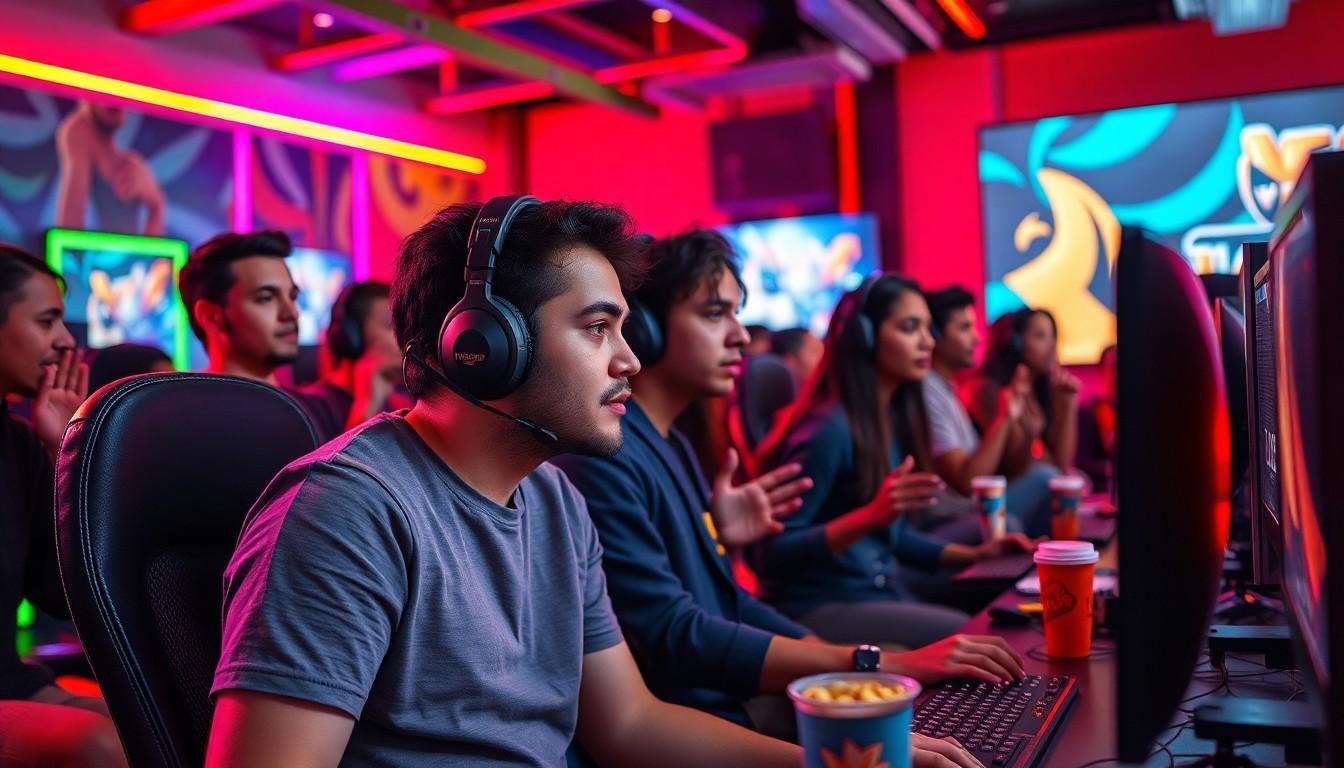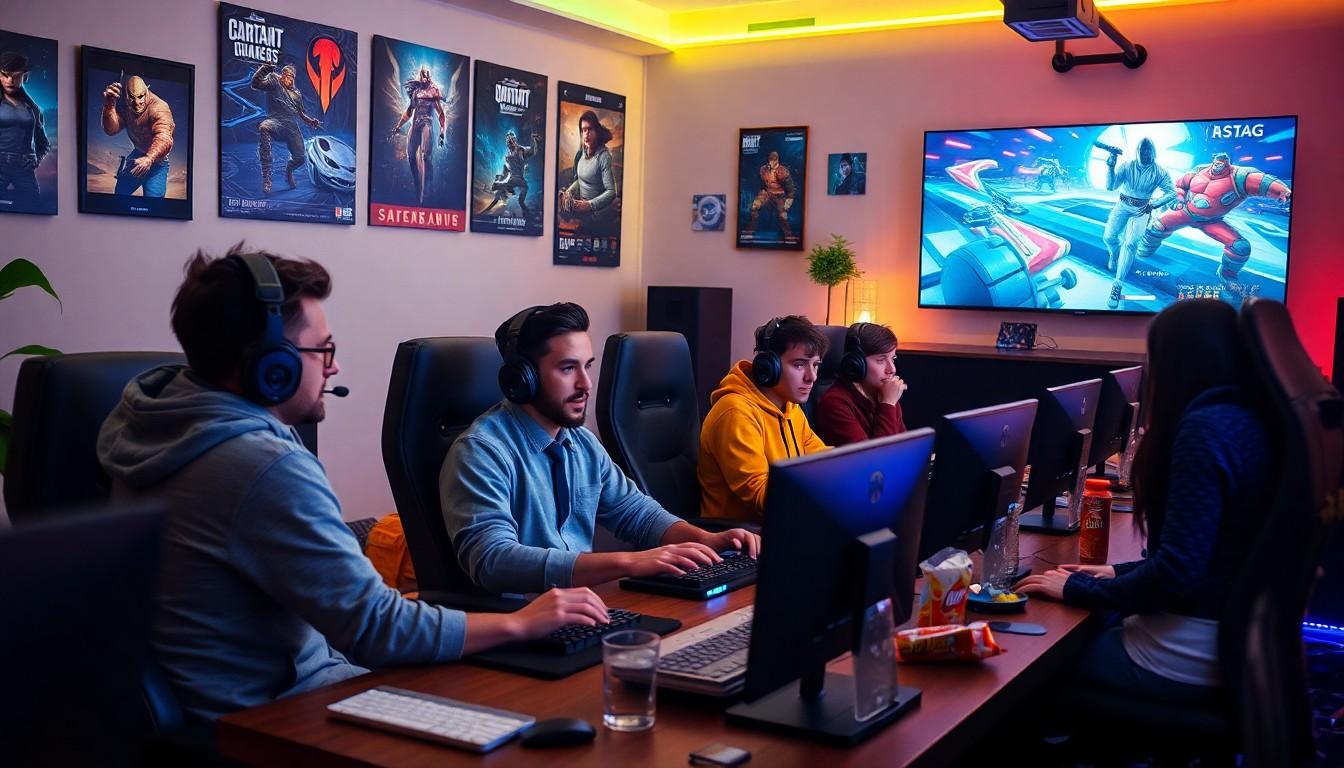Phone:
(701)814-6992
Physical address:
6296 Donnelly Plaza
Ratkeville, Bahamas.

In the world of gaming, it’s not just about the pixels on the screen; it’s about the people behind those controllers. Esports communities have exploded in popularity, transforming casual players into dedicated fans and fierce competitors. Whether it’s cheering for a favorite team or engaging in heated debates over strategies, these communities are where friendships are forged and rivalries ignite.
Imagine a place where everyone speaks the same language—fragging, leveling up, and epic fails. Esports communities offer that and more, blending competition with camaraderie. They’re like a digital clubhouse where gamers unite, swap tips, and occasionally argue about who’s the best Fortnite player (spoiler alert: it’s always a heated topic). Dive into the vibrant world of esports communities and discover how they shape the future of gaming while creating bonds that go beyond the game itself.
Esports communities serve as vibrant hubs for gamers worldwide. Members build connections through shared experiences and mutual interests in specific games. Players engage with one another, discussing strategies, game updates, and competitive events. Such interactions transform casual gamers into dedicated fans and skilled competitors.
These communities often take shape on platforms like Discord, Reddit, and dedicated gaming forums. Platforms facilitate communication and collaboration, allowing gamers to form clans, teams, and friendships. Bonds formed within these spaces often extend beyond the digital realm, resulting in real-world friendships and collaborations.
Participation in esports communities encourages skill development. Members practice together, participate in tournaments, and share best practices. Growth occurs not just in gameplay but also in strategic thinking and teamwork. Many communities host regular events, fostering a sense of belonging and motivation among players.
Esports communities positively impact the landscape of gaming culture. They cultivate a supportive environment, welcoming newcomers and fostering inclusivity. Alternate views and strategies are exchanged, stimulating growth for all members.
Many top esports organizations and tournaments emerge from these communities, showcasing talent and elevating competitive gaming. Events often attract thousands of spectators, demonstrating the reach and influence these communities have on the industry. As the competitive landscape evolves, the significance of esports communities continues to grow, shaping the gaming experience for millions.

Esports communities thrive on interaction and connectivity among players. These unique spaces encourage deep engagement through various activities and support mechanisms.
Active participation defines player engagement within esports communities. Gamers frequently join discussions about new strategies, tactics, and game mechanics. Competitions and tournaments often feature prominently on platforms like Discord and Reddit. Engaging in regular matches or scrimmages enhances player skills and fosters friendships. Members motivate each other, share personal achievements, and celebrate wins. Community events such as game nights or watch parties further solidify bonds and heighten excitement. Esports communities create an environment where players feel invested in each other’s progress, paving the way for collaborative growth.
Support within esports communities stands out through shared resources and encouragement. Members provide each other with insights on gameplay and tactics. Peer support manifests through coaching, feedback, and constructive criticism. Many communities establish mentorship programs, pairing novice players with veterans. Inclusivity remains a priority, welcoming diverse backgrounds and skill levels. Regular community events promote a sense of belonging, enhancing players’ confidence in their abilities. By fostering communication and collaboration, these communities cultivate an atmosphere where everyone can thrive, reinforcing the positive dynamics of competitive gaming.
Esports communities take various forms, each fostering unique connections among gamers. These communities enhance the overall gaming experience through shared interests and collaborative efforts.
Online communities thrive on platforms like Discord and Reddit. Gamers connect across the globe, discussing strategies, sharing gameplay videos, and forming teams. These digital spaces create opportunities for collaboration, allowing members to engage in skills development through practice and mentorship. Events such as tournaments and live streams draw significant participation, further boosting camaraderie. Active discussions and shared resources make online communities integral to a gamer’s journey.
Local and regional communities play a vital role in connecting gamers within specific geographic areas. These communities often host in-person events, providing opportunities for face-to-face interactions. Game nights and local tournaments encourage competition and friendship among participants. Players find a sense of belonging through shared experiences and shared strategies. Additionally, local venues might offer events that celebrate the esports culture, reinforcing community bonds and creating lasting memories.
Social media platforms play a crucial role in the dynamics of esports communities. Discord serves as a central hub where players communicate in real time about games, strategies, and upcoming tournaments. On Reddit, users share insights and experiences, fostering deeper connections among players. Engagement thrives as members post gameplay videos and tips, attracting discussions that enhance skills and strategy applications.
Twitter is another vital platform for esports communities. Gamers follow tournament updates and player announcements, creating a pulse for the latest happenings in the industry. Members often communicate directly with their favorite players or teams, further blurring the lines between fans and competitors.
Instagram highlights the visual aspect of esports, showcasing clips of thrilling plays, behind-the-scenes content, and community events. Followers can connect through hashtags like #Esports and #GamingCommunity, expanding their network and involvement. These platforms amplify the sense of belonging, as users celebrate achievements together.
Twitch emphasizes live interaction, with viewers participating in streams and chats. Many esports communities organize viewing parties, encouraging participation in real-time discussions around games. This facilitates a connection that extends beyond gameplay, allowing fans to share their passion.
In-person and virtual events often stem from social media interactions. Organizers frequently promote tournaments on various platforms, attracting participants and spectators alike. Engagement through these platforms fosters strong community ties, enhancing the player experience and motivation.
Social media’s influence reinforces esports communities by providing accessible spaces for interaction and support. As gamers continue to share experiences and strategies online, the richness of community life grows, enriching the overall gaming landscape.
Esports communities encounter several significant challenges that impact their growth and sustainability. One prevalent issue is toxicity among players, which can deter new members from participating. Toxic behavior often manifests in harassment or negative comments during gameplay, creating an unwelcoming environment.
Another challenge involves inclusivity. Many communities struggle to ensure that all players, regardless of skill level or background, feel welcomed. Creating a diverse space remains essential for community growth. Fostering inclusivity encourages broader participation and enriches conversations among members.
Sustainability represents a crucial concern as well. Maintaining an active membership can become difficult over time. Communities often rely on dedicated members to keep discussions vibrant and relevant, and without new participants, interest may dwindle.
Monetization strategies pose additional hurdles. Many communities wish to support their activities financially but lack clear pathways for raising funds. Introducing sponsorships or merchandise can create revenue streams, but implementing these strategies effectively requires careful planning and management.
Lastly, the rapid evolution of gaming technology can lead to fragmentation within communities. As games change frequently, maintaining a cohesive focus becomes challenging. Communities may find it difficult to keep everyone engaged when new titles attract attention and shift discussions away from previously beloved games.
Addressing these challenges demands collective effort from members and leaders alike. Supportive environments depend on active participation and mutual respect. By prioritizing inclusivity, sustainability, and positive interactions, esports communities can thrive amid these challenges.
Esports communities are essential to the gaming landscape. They foster connections that go beyond the screen, creating friendships and support networks among players. As these communities continue to evolve, they play a crucial role in shaping the future of competitive gaming.
Despite facing challenges such as toxicity and inclusivity issues, the commitment to creating welcoming environments remains strong. With ongoing efforts to enhance engagement and collaboration, these communities are poised to thrive.
Ultimately, esports communities are more than just digital spaces; they represent a movement that transforms gaming into a shared passion, uniting players from all walks of life. As they grow, they’ll undoubtedly continue to influence the gaming culture and industry for years to come.